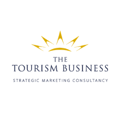As we continue our journey into 2022, it's interesting to ponder what the outcomes are likely to be for the travel and tourism industry over the next year.
To cut to the chase, we don’t have the luxury of taking it slowly. In fact, the key focus that I think is essential for travel and tourism business success this year, is to grow brand presence and really go all-out on making a noise about themselves, in order to attract customers and visitors. My reasoning sits atop the following three factors.
One: We treated ourselves when travel opened up before - but that doesn’t mean we will do so this time.
If we think of when travel opened up historically, (and when I say historically, I actually just mean about a year ago, because it has been so up and down), there was quite a bit of euphoria about people having savings and money available to spend, because they hadn't been spending as much on leisure and travel for the last couple of years.
Consequently, we saw an increase in spending on luxury trips and bookings, as people were more open to treating themselves. However, I don't think that's going to happen this time around, despite travel restrictions becoming more relaxed. This is due to the wider and longer term economic impact of the pandemic which we’re starting to now feel.
Point Two: Inflation and lower expendable income
Prices for clothes, groceries, energy, petrol are increasing significantly. It could be argued this has been matched with an increase in salaries, but for the majority of people, inflation will outpace salary growth. This results in people having less money, and so we're going to be much more considered and a bit more frugal when it comes to our travel and tourism choices this year. What this could mean, is that visitors are left with the choice of a domestic trip over an international trip this year.
And this really is where the battleground is going to be. Will people take more holidays this year? Will they focus again on domestic holidays and look locally within the UK for their summer experience? Or will they go abroad?
The fact is, travelling abroad into Europe can sometimes be cheaper. When you're in a European destination, going out for dinner, visiting an attraction, using public transport, can be a cheaper than the equivalent activities here in the UK. Add to this the relative strength of the pound against the Euro, and the cheaper option for tourists might well be to go abroad.
But is this being reflected in international travel bookings currently?
Well, in some cases ‘yes’ - try booking a large family villa in the summer holidays in popular European destinations and you will struggle. They are all taken, with family and friends at home and abroad finding a space to holiday together.
Contrastingly, in the last few days, Ryanair has decided to reduce prices on a lot of its fares and this isn’t indicative of unbelievable pent up demand and competition, it’s a signal to encourage people to book and to get them to go abroad, meaning that people aren’t necessarily committing to international trips yet.
This see-saw of antagonistic trends, and the unpredictability of the marketplace, reinforces to me that travel and tourism brands need to do whatever to appear, and remain front of mind for potential customers.
Point Three: Consumer spending is down
As inflation goes up, prices go up, and consumer spending slows down. We can also see that the output of this has already been recognised with retail sales, which have been reducing significantly over the last few months. CBI figures show that the UK had a 3.7% reduction in sales over Christmas, which is usually a time when significant sales are expected.
On the flip side of this, Amazon is continuously hiring more and more workers, due to the significant shift to online shopping. However overall, there has been a noticeable reduction in retail sales in January than would have been expected.
As another viewpoint, take the town of Newport in Wales as a microcosm of a wider national economic climate. Newport has been cited as the area of the UK with the most closed down retail and high street shops, with the figure standing at over 30% of businesses. It’s believed that the majority of these will remain permanently closed.
Overall, these 3 factors point towards challenging economic conditions, at a time when we were hoping for opportunity and abundance. This might not be the case, and in the absence of consumer confidence and certainty, we don't have the luxury of taking it slowly.
To combat the difficulties ahead, I urge travel and tourism businesses to start to upping the ante when it comes to their communications and how they grow their brand profile.











